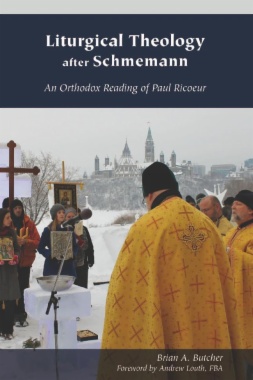

While only rarely reflecting explicitly on liturgy, French philosopher Paul Ricoeur (1913-2005) gave sustained attention to several themes pertinent to the interpretation of worship, including metaphor, narrative, subjectivity, and memory. Inspired by his well-known aphorism, “The symbol gives rise to thought,” Liturgical Theology after Schmemann offers an original exploration of the symbolic world of the Byzantine Rite , culminating in a Ricoeurian analysis of its Theophany “Great Blessing of Water.” .
The book examines two fundamental questions: 1) what are the implications of the philosopher’s oeuvre for liturgical theology at large? And 2)how does the adoption of a Ricoeurian hermeneutic shape the study of a particular rite? Taking the seminal legacy of Orthodox theologian Alexander Schmemann (1921-1983) as its point of departure, Butcher contributes to the renewal of contemporary Eastern Christian thought and ritual practice by engaging a spectrum of current theological and philosophical conversations.